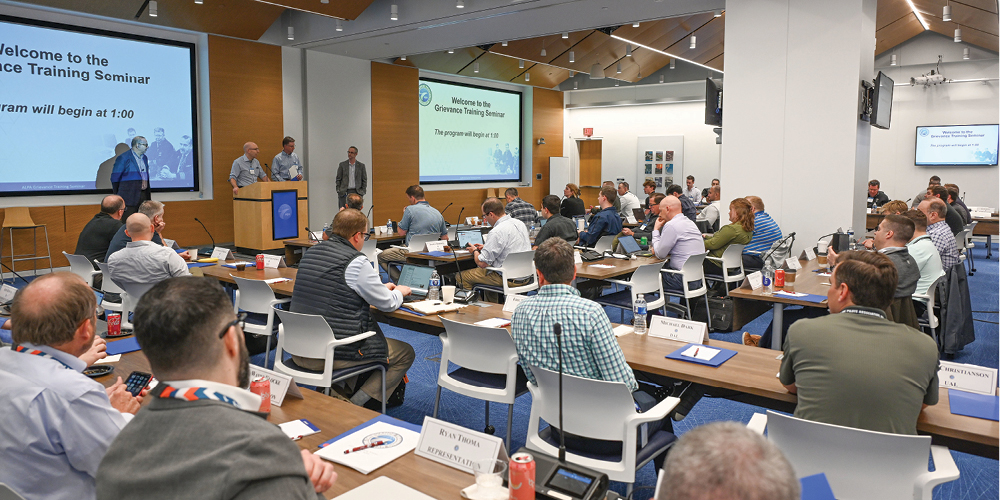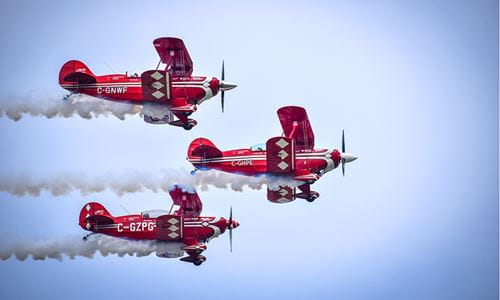
Annual Seminar Examines Contract Enforcement as Strategic Objective

Nearly 60 pilot Grievance Committee volunteers, representing almost half of ALPA’s member pilot groups, joined labor relations counselors and other staff professionals for the Association’s annual Grievance Training Seminar on April 1–3 at ALPA’s McLean, Va., headquarters. This year’s event placed a special emphasis on contract enforcement as a master executive council (MEC) strategic objective to ensure that pilots fully reap the benefits of the contracts they so diligently work to secure.
Reviewing the training agenda, Jeff Loesel, the Association’s Representation Department managing attorney–collective bargaining and dispute resolution, noted, “We’ve set this event up to be more conversational and reengineered the format to be more interactive. This conference isn’t just about explaining your responsibilities; it’s about how to more deliberately and strategically perform this job.”
ALPA’s current administration has placed a special emphasis on the grievance process, establishing the President’s Grievance Committee in 2023. In a Dec. 28, 2023, communication, Capt. Jason Ambrosi, the Association’s president, asserted, “It’s not enough to just negotiate superior deals; we must also hold management accountable and ensure they comply with the terms.” He told ALPA members, “The details may differ, but the solution is always the same: pilots working together.”
In addition to assisting with presentations and facilitating exercises, members of the President’s Grievance Committee—Capt. David Kidder (JetBlue), chair, and Capt. Phil DiCostanzo (United), Capt. William Finlay (Delta), Capt. Iam Bouret (Hawaiian), F/O Stanton Schelling (Frontier), Capt. Gil Renaud (Jazz Aviation), and Capt. Mary Murphy (FedEx Express)—had an opportunity to discuss their work and insights with meeting attendees.
These pilots talked about their work with individual MEC Grievance Committees and reviewed several current projects, including the proposal process for acquiring new litigation software designed to help pilot groups better manage their caseload and the development of a new contract comparison guide. The committee will also conduct virtual seminars on grievance drafting and mediation later this year.
Another panel discussion focused on best practices for contract enforcement as part of each MEC’s strategic plan. The panel featured Kidder; Capt. Dana Dann-Messier (Delta), the Association’s Strategic Planning Committee lead; and Capt. Phil Otis (United), ALPA’s Collective Bargaining Committee chair. Kidder framed the discussion, noting, “Besides a pilot group’s Negotiating Committee, the Grievance Committee is the only committee that touches every part of the contract.”
Dann-Messier emphasized the need for MECs to include contract enforcement as a key element of strategic plans and the importance of dedicating resources, while Otis spoke about the value of coordinating with the Negotiating Committee to better support each other and leverage opportunities. The panelists agreed that MECs must coordinate grievance efforts with all committee activities to ensure they work in unison.
During another presentation, Murphy discussed the grievance process and associated tactics when preparing for arbitration.
The three-day conference also featured a detailed examination of the union’s contract enforcement and disciplinary representation efforts, offering tips for expediting processes to increase the likelihood for success. Participants learned about preparing for disciplinary cases and drafting and filing grievances. They reviewed the use of mediation and the system board of adjustment in the United States and Canada, as well as alternative dispute-resolution methods available, all while considering the roles these grievance tools play as components of a larger strategic plan.
Andrew Shostack, director of the Association’s Representation Department, pointed out, “There’s no independent right to file a grievance without a collective bargaining agreement.” He observed that the dispute in question must be addressed in the contract or implied based on past practice. Another important consideration is whether a logical remedy exists.
To help the participants better comprehend what they’d learned, the seminar featured hands-on exercises, including a grievance drafting workshop in which the group reviewed a hypothetical DART from a pilot. They engaged in a grievance hearing simulation, based on a deidentified scenario an ALPA pilot group actually encountered, and also watched and remarked on a mock mediation session.
Capt. Wes Clapper, the Association’s vice president–finance/treasurer, who participated in several segments throughout the three days, provided an important insight. He noted that one of the greatest benefits of this specialized training is the opportunity to network with and get to know grievance peers from other pilot groups, a unique benefit of ALPA membership.
This article was originally published in the May 2025 issue of Air Line Pilot.












